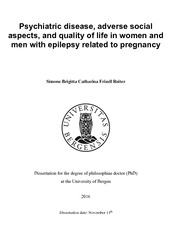| dc.contributor.author | Reiter, Simone Brigitta Catharina Frizell | en_US |
| dc.date.accessioned | 2017-01-16T13:11:02Z | |
| dc.date.available | 2017-01-16T13:11:02Z | |
| dc.date.issued | 2016-11-11 | |
| dc.identifier.isbn | 978-82-308-3213-4 | en_US |
| dc.identifier.uri | https://hdl.handle.net/1956/15429 | |
| dc.description.abstract | Background: Epilepsy occurs in 0.7-1.3 % of the population and affects both genders and all age groups, including women and men of fertile age. Epilepsy is an important cause of disability with consequences for work possibilities, social life and family planning. Psychiatric comorbidity is associated with the condition. The total burden of having epilepsy may affect life quality. Pregnancy is an exciting period for expecting parents, and often women and men are in an optimal phase of life when they decide to have children. However, pregnancy can also be a more vulnerable period for both expecting mothers and fathers. Aims: In this work it is hypothesized that expecting mothers and fathers with epilepsy are more vulnerable in the period before, during, and after pregnancy than individuals without epilepsy. This can affect both mental health and life satisfaction negatively. To investigate such aspects it is necessary to examine a broad spectrum of factors, such as psychiatric comorbidity, burden of symptoms, socioeconomic conditions and different aspects of life quality. It has been postulated that there is an epilepsy-specific association with such aspects as compared to other chronic disorders. We have elucidated these questions through epidemiological studies of a large population-based cohort. Material and methods: This work comprises three cross-sectional studies, based on self-reported data from the prospective database of the Norwegian Mother and Child Cohort Study, carried out by the Norwegian Institute of Public Health. Supplementary data on diagnoses and medications were obtained from the Medical Birth Registry of Norway. The study population comprised more than 102,000 pregnancies registered on approximately 95,000 women and 76,000 men recruited from the general population of expecting parents in Norway. From these, more than 700 women and 650 men with epilepsy were identified. The data for the three studies in this thesis was collected in pregnancy weeks 13-17, and 6 and 18 months post-partum. Results: The frequencies of self-reported psychiatric diseases and psychiatric symptoms were higher in women and men with epilepsy compared to controls, both prior to and during pregnancy. Adverse social aspects were also more common in epilepsy during and after pregnancy. The association with adverse social conditions seen in persons with epilepsy accounted for some of the differences in psychiatric comorbidity. For some psychosocial aspects the associations were stronger for epilepsy than for other chronic diseases. Several psychiatric diseases showed a higher prevalence when assessed through screening instruments than as self-reported diagnoses. Life satisfaction and self-esteem were lower in expecting women and men with epilepsy during pregnancy, and also in women in the postpartum period and later. Conclusions: This work demonstrates that both women and men with epilepsy struggle more with challenges concerning mental health and social aspects before, during and after pregnancy compared to persons without epilepsy. Psychiatric problems appear to be underreported, leaving those in need of follow-up for such problems at risk of poorer health outcome and quality of life. This is particularly important to recognize in persons already burdened by a chronic condition such as epilepsy. Expecting fathers’ and mothers’ mental well-being is important because it may affect delivery and predict postpartum mental health in both parents. Persons with epilepsy being at risk of mental complaints and having socioeconomic problems should be identified prior to pregnancy and offered proper follow up. Screening instruments for mental complaints and quality of life represents an easy method of identifying such problems and indicating the need for further surveillance or intervention. Such instruments could be adjusted to suit prenatal care situations for expecting parents. | en_US |
| dc.language.iso | eng | eng |
| dc.publisher | The University of Bergen | eng |
| dc.relation.haspart | Paper I: Reiter SF, Veiby G, Daltveit AK, Engelsen BA, Gilhus NE. Psychiatric comorbidity and social aspects in pregnant women with epilepsy - the Norwegian Mother and Child Cohort Study. Epilepsy and Behavior. 2013 Nov;29(2):379-85. <a href=" http://dx.doi.org/10.1016/j.yebeh.2013.08.016" target="blank">http://dx.doi.org/10.1016/j.yebeh.2013.08.016</a> | en_US |
| dc.relation.haspart | Paper II: Reiter SF, Veiby G, Bjørk MH, Daltveit AK, Engelsen BA, Gilhus NE. Psychiatric comorbidity, social aspects and quality of life in a population-based cohort of expecting fathers with epilepsy. PLOS ONE. 2015 Dec 4;10 (12):e0144159. <a href="http://hdl.handle.net/1956/11655" target="blank">http://hdl.handle.net/1956/11655</a> | en_US |
| dc.relation.haspart | Paper III: Reiter SF, Bjørk MH, Daltveit AK, Veiby G, Kolstad E, Engelsen BA, Gilhus NE. Life satisfaction in women with epilepsy during and after pregnancy. Epilepsy and Behavior. 2016 Aug 8;62:251-257. <a href="http://dx.doi.org/10.1016/j.yebeh.2016.06.025" target="blank">http://dx.doi.org/10.1016/j.yebeh.2016.06.025</a> | en_US |
| dc.title | Psychiatric disease, adverse social aspects, and quality of life in women and men with epilepsy related to pregnancy | en_US |
| dc.type | Doctoral thesis | |
| dc.rights.holder | Copyright the author. All rights reserved. | |
| dc.subject.nsi | VDP::Medisinske Fag: 700::Klinisk medisinske fag: 750::Nevrologi: 752 | en_US |
